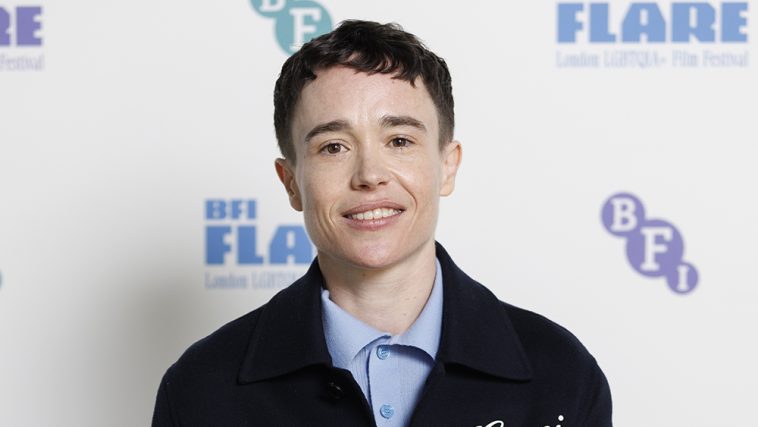Elliot Page, a well-known actor who identifies as transgender, has expressed concerns about the common Hollywood belief that films centering around queer individuals do not appeal to a mainstream audience. Addressing an audience at BFI Flare, a popular film festival in London with a focus on LGBTQ+ representation, Page emphasized that such movies can’t be considered ‘niche’. He cited a recently conducted survey which found that almost 30% of American youth identify as belonging to the LGBTQ+ community. Under such circumstances, he stated, ‘I’m sorry, but this is not niche’, challenging popular perceptions about the audience for these films.
Page shared a personal anecdote about the time when he revealed his transgender identity to Steve Blackman, the showrunner for the famous Netflix series, ‘The Umbrella Academy’. He praised Blackman’s response and his willingness to update Page’s character in line with his transition, but also acknowledged his ambivalence about expressing such gratitude. ‘I hate that I have to say [that I feel lucky] because it should not be the case, and we should have lots of trans actors’, Page asserted.
Page is currently involved in a film project titled ‘Close to You’. This narrative explores the journey of a woman who, after having transition surgery, develops feelings for a man she knew from her past. While speaking about the film in a recent interview, Page reflected on the unprecedented move to depict a scene with his character appearing shirtless post-transition surgery.
According to Page, the goal is to foster understanding about the various experiences within the LGBTQ+ community. It necessitates breaking down preconceived notions and broadening perspectives on what society likes to label as ‘the gay agenda’ — a term often used with negative connotations, but which Page is reclaiming to describe the fight for representation and inclusivity.
An important aspect of Page’s identity is his non-binary status. His chosen pronouns are ‘he/him’ and ‘they/them’. By sharing these details with the public, he aims to normalize dialogue around gender identity and the diverse experiences within the transgender community.
In regard to acting accolades, Page has actively voiced his support for making such awards gender-neutral. He criticizes the industry’s outdated practice of dividing categories based on gender. Several notable award institutions, including the Oscars, have shifted towards more neutral terminologies, dropping labels such as ‘Best Actress’, a trend Page applauds.
‘Yeah, it seems like a good idea,’ Page expressed in an interview with Entertainment Weekly. He highlighted the peculiarity of having such a gender-specific category when so many others in the industry are not. Page’s comments are in favor of a future that moves beyond such binary thinking.
In conclusion, it is evident that Elliot Page, both through his personal journey and his professional actions, is endeavoring to reshape mindsets about the LGBTQ+ community in Hollywood and beyond. His stance that representation matters and films about queer individuals should not be treated as ‘niche’ reflects his belief in the power of diverse storytelling.
Moreover, his personal experiences underline the need for the industry to be more accommodating for transgender actors. His viewpoint shines a light on the struggles and the discrimination that such performers may face, and highlights the necessity to make the industry more receptive to these actors.
This necessity is not only limited to the entertainment industry but also extends to our broader society. By opening up about his own experiences and demanding change in various aspects, from film representation to award classifications, Page is advocating for increased visibility and inclusion for all individuals within the LGBTQ+ community, regardless of their unique experiences.
His commitment to improving the narrative of the LGBTQ+ community is profound. Through his work, he strives to encourage society to be more accepting, to question norms, and to better understand perspectives that are different from their own. His views on award classifications further reinforce his stanze for equality and inclusion.
Page’s articulation of these broader issues pushes boundaries and sparks conversations by making personal identity and professional life intersect. His beliefs and experiences illustrate the positive influence that prominent figures in the industry can have on shifting people’s perceptions and challenging the status quo.
Elliot Page’s endeavors not only pertain to his influential career but also resonate with the lives of individuals beyond the film fraternity. His journey shines a light on the global need for acceptance, understanding, and transformation.
Page’s belief that the industry’s and society’s perceptions need to evolve is a call to action for all, reaffirming the necessity of progression beyond binary thinking. His stance is an illustration of the march towards a more inclusive society, where everyone is allowed to exist and thrive without fear of judgment, stigma, or discrimination.


